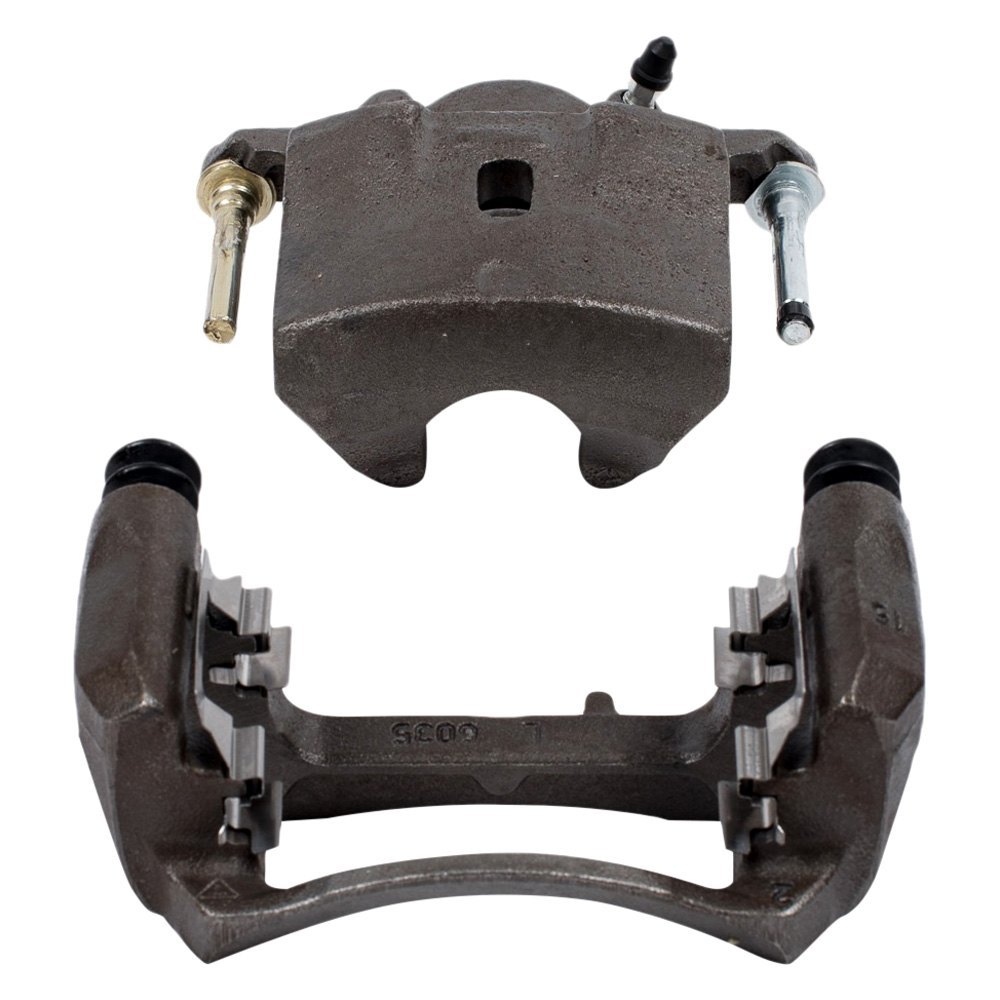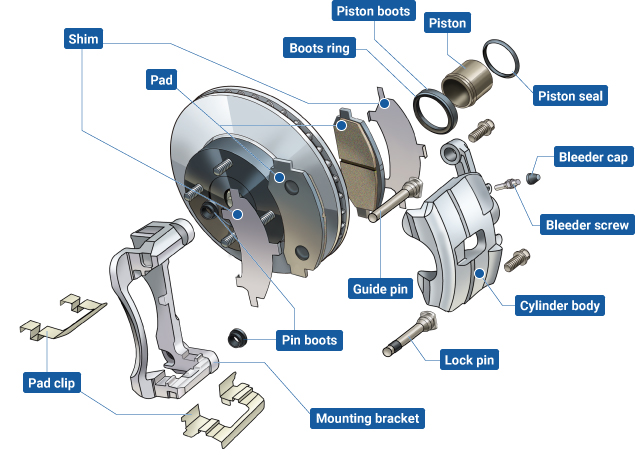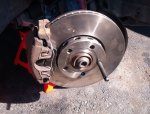You are using an out of date browser. It may not display this or other websites correctly.
You should upgrade or use an alternative browser.
You should upgrade or use an alternative browser.
Greasing the brake pad pins?
- Thread starter Gebo
- Start date
I clean up the keeper pins on the wire wheel and the caliper holes with a file for any surface rust or material.
I do use a very tiny amount of grease, just on the contact points.
I do use a very tiny amount of grease, just on the contact points.
I would not do that. Lubricant on the pins can drip down and contaminate the pads. What I recommend is to replace the pins at first sign of wear. You can also sand out the rough spots if they are not too bad.
Spoken like someone who doesnt live with a real winter and road salt?
a tiny dab of any lube that has a good % of solids should be fine. not best idea ever but neither is road salt.
Spoken like someone who doesnt live with a real winter and road salt?
a tiny dab of any lube that has a good % of solids should be fine. not best idea ever but neither is road salt.
It's cool your choice. !f lubing the pins works for you go for it. The reason I don't grease the pins is not only pad contamination but dirt and grit causing the pads to stick.
What cars are those?
Most (all?) US cars bakes are of the floating caliper design, don't have any "pins" that go trough the brake pads. The pads' steel base is resting (and sliding) on some flat edges on the caliper, usually covered with brass or stainless steel. The only things to lubricate are the slide pins and those metallic flat parts. I use brake lube, designed to handle the intense brake heat.
This is typical for Ford, GM, Kia, Hyundai, Toyota...


Most (all?) US cars bakes are of the floating caliper design, don't have any "pins" that go trough the brake pads. The pads' steel base is resting (and sliding) on some flat edges on the caliper, usually covered with brass or stainless steel. The only things to lubricate are the slide pins and those metallic flat parts. I use brake lube, designed to handle the intense brake heat.
This is typical for Ford, GM, Kia, Hyundai, Toyota...


Last edited:
Those are very common, "performance" brake calipers. Well, maybe not common, but not rare. On many models, for instance, Infiniti G35s, the "Sport" package will include this style brake. My brother's Tundra has them as well as my son-in-law's Sequoia and those aren't "sports" cars. Brembo makes brakes like this and others have copied them, including Akebono, for example.What cars are those?
US cars bakes are of the floating caliper design, don't have any "pins" that go trough the brake pads.
ls1mike
$50 Site Donor 2024
Grease on all the contact points. Helps with movement and noise.
I'm pretty sure I've worked on at least a couple floating calipers that had similar metal clips for the pads. For the exact vehicles, I'd really have to think about it. It'll probably come back to me, I think my '01 Jetta was one of them.
My Totota Tundra has 4 piston fixed calipers. So did my '93 Pickup 4WD.
What cars are those?....
Toyota and Lexus. The vehicle in question is a 2002 4Runner.
My pins were really nasty looking. I used a wire brush and got them shiny again. It got too late to finish last night. I'm have an
intermittent shimmy, like the rotors are warped. One day everything is perfectly smooth. Next day I get a shimmy. I was wondering
if somehow my pads were sticking a little. I have "new" OEM rotors and pads and l only use Toyota grease.
I may experiment with no grease just to see if it works. I gotta a long trip up the mountain today so I'll be able to test out my theory.
intermittent shimmy, like the rotors are warped. One day everything is perfectly smooth. Next day I get a shimmy. I was wondering
if somehow my pads were sticking a little. I have "new" OEM rotors and pads and l only use Toyota grease.
I may experiment with no grease just to see if it works. I gotta a long trip up the mountain today so I'll be able to test out my theory.
I’m not familiar with your setup. My 2013 RX 350 is identical to the picture shown in SoNic67’s post.
I use Mission Automotive Dielectric grease on the guide/lock pins and very little CRC synthetic break and caliper grease on the break pad metal tips that contact the pad clips.
Rules I use: metal to metal contact points that move should be greased, use the proper grease, use very little, absolutely no grease on pad break material/rotors, when in doubt leave it out, use common sense.
I use Mission Automotive Dielectric grease on the guide/lock pins and very little CRC synthetic break and caliper grease on the break pad metal tips that contact the pad clips.
Rules I use: metal to metal contact points that move should be greased, use the proper grease, use very little, absolutely no grease on pad break material/rotors, when in doubt leave it out, use common sense.
Interestingly enough....the Akebono ACT976 pads that I put on my Tacoma actually came with a small pack of grease for the pins. I ended up not using it enlue of a bit of antiseize....but still, someone must have thought it was a good ideaIt's cool your choice. !f lubing the pins works for you go for it. The reason I don't grease the pins is not only pad contamination but dirt and grit causing the pads to stick.
The Jetta just used the usual 2-bolt Teves calipers. The pads have a flimsy metal clip to hold them into the pistons and then a spring on the outside pad as “anti-rattle”I'm pretty sure I've worked on at least a couple floating calipers that had similar metal clips for the pads. For the exact vehicles, I'd really have to think about it. It'll probably come back to me, I think my '01 Jetta was one of them.
Attachments
Look at what the manufacturer recommends - they vary.
Based on cars I've worked on -- BMW is DRY PINS (very explicitly). Toyota is lubed pins. My Acura (long time ago) was lubed pins.
Based on cars I've worked on -- BMW is DRY PINS (very explicitly). Toyota is lubed pins. My Acura (long time ago) was lubed pins.
I grease all the ones I work on. Even the new ones. Wire wheel the old ones if the replacement pads don't include them. You need to lube them in the rust belt or they'll be seized.
If you have problems of grease dripping onto your pads, you are using way too much.
If you have problems of grease dripping onto your pads, you are using way too much.
Not necessarily. There were 2 different calipers used on the MK4's.The Jetta just used the usual 2-bolt Teves calipers. The pads have a flimsy metal clip to hold them into the pistons and then a spring on the outside pad as “anti-rattle”
2.slow and TDI's with 280mm front brakes, had the caliper attached to the wheel bearing housing with no "anti-rattle" clip, just metal clips on both pads

1.8T & VR6 with 288mm and 312mm front brakes is what you have pictured.
My RAV4 and Sienna have floating calipers.Toyota and Lexus. The vehicle in question is a 2002 4Runner.
Ford Explorer, Kia XG35 and Ford Edge have front floating calipers with 2 pistons. Pistons on same side (larger brake pads).
I use the synthetic brake lube on everything. Even the pins get hot by transfer, and that dielectric grease can't handle high temperatures that well. It will bake in and drag a caliper.I use Mission Automotive Dielectric grease on the guide/lock pins and very little CRC synthetic break and caliper grease on the break pad metal tips that contact the pad clips.
Last edited:
Similar threads
- Replies
- 17
- Views
- 862
- Replies
- 30
- Views
- 3K
- Replies
- 36
- Views
- 1K
- Replies
- 18
- Views
- 2K
- Replies
- 42
- Views
- 4K

